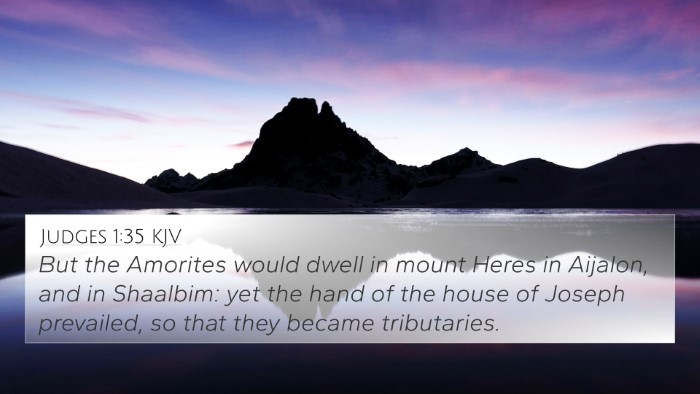Understanding Judges 1:33
The verse Judges 1:33 states: "Naphtali did not drive out the inhabitants of Beth Shemesh, or the inhabitants of Beth Anath; but he dwelt among the Canaanites, the inhabitants of the land: nevertheless the inhabitants of Beth Shemesh and of Beth Anath became tributaries unto them."
Contextual Background
This verse is set in the context of the Israelite conquests in the Promised Land after the death of Joshua. The tribes were charged with driving out the Canaanites, yet many, including Naphtali, failed to completely fulfill this command. Instead, they coexisted with these inhabitants, which becomes a theme of compromise.
Commentary Insights
Matthew Henry's Commentary
Matthew Henry emphasizes that the failure of Naphtali to drive out the Canaanites reflects a broader spiritual malaise among the Israelites. He notes that partial obedience can lead to problematic coexistence. The verse illustrates the struggle of the Israelites as they attempt to mix their identity and faith with the surrounding cultures.
Adam Clarke's Commentary
Adam Clarke expands on the idea of tribal identity, questioning the consequences of Naphtali's choices. He asserts that by living among the Canaanites, the tribe faced spiritual and moral dilution, which reflects a lack of trust in God's promises. Instead of being conquerors, they became subjugated to their neighbors in a tributary relationship.
Albert Barnes' Commentary
Albert Barnes notes that Naphtali’s failure also showcases the Israelite systems of governance at this time, where not all tribes equally engaged in conquest. He highlights the notion that these Canaanite towns would eventually become tributaries, suggesting both a recognition of Israelite authority and the lamentable compromise of not fully driving them out, which would have been God's intent.
Thematic Connections to Other Scriptures
This verse resonates with numerous passages throughout the Bible that reflect themes of obedience, coexistence, and the consequences of compromise. Here are several Bible verse cross-references that relate to Judges 1:33:
- Numbers 33:55 - Highlights the consequences of failing to drive out inhabitants: "But if you do not drive out the inhabitants of the land from before you, then it shall come to pass that those whom you let remain shall be irritants in your eyes and thorns in your sides."
- Deuteronomy 7:2 - Commands the Israelites to utterly destroy the nations: "And when the Lord your God delivers them over to you, you shall conquer them and utterly destroy them."
- Judges 2:1-3 - God expresses disappointment over Israel's disobedience and warns of future consequences.
- Joshua 17:12-13 - Details of the tribes’ struggles in the land and how Canaanites were allowed to remain.
- 1 Samuel 15:3 - Samuel conveys God’s command about complete destruction of enemies, reaffirming the call for total obedience.
- Matthew 10:16 - Jesus admonishes disciples to be "wise as serpents," symbolizing the need for discernment in a challenging environment.
- Romans 12:2 - Encouragement against conforming to the world, paralleling Israel’s compromise with Canaanite culture.
Applying the Message of Judges 1:33
Judges 1:33 serves as a cautionary tale about the repercussions of spiritual compromise and partial obedience. The invitation to reflect on this verse encourages believers to ponder their own lives, examining where they may be settling for less than God's best.
Tools for Bible Cross-Referencing
To deepen your understanding, one might utilize various tools for Bible cross-referencing such as:
- Bible concordance to locate terms and their occurrences throughout Scripture.
- Bible cross-reference guide for thematic exploration across different passages.
- Comprehensive Bible cross-reference materials that catalog connections for in-depth study.
InterBiblical Connections
The verse in Judges interacts not only with the Old Testament narratives but also with New Testament teachings. Understanding the links between the Old Testament and New Testament is crucial for grasping the full scope of Biblical principles.
SEO Keywords Integration
As we explore cross-referenced themes in the Bible, Judges 1:33 underscores the need for comprehensive Bible cross-reference materials to connect themes of obedience, identity, and the consequences of compromise. Learning how to find cross-references in the Bible can lead to a more enriched understanding of God's message throughout Scripture.
Conclusion
Judges 1:33 is a pivotal verse that unveils the complexities faced by the Israelites as they settled in the Promised Land. The multitude of Bible verses that relate to each other can aid readers in drawing connections and thematic insights, leading to profound spiritual reflections and applications.






